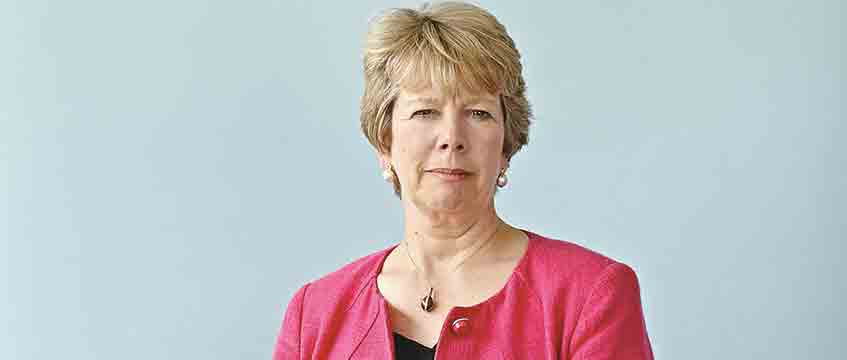By a country mile, or even a couple of CBDs, the biggest non-US backer of the global real estate business is AXA.
The French asset manager sits in fifth place in the <em>Estates Gazette</em> global investor league table, behind Brookfield, CBRE Global Investors, Blackstone and Tishman Speyer in terms of total assets. The biggest investors from Asia, China Vanke and ?Japan’s Mitsubishi Estate, are some billions behind, while Deutsche Asset and Wealth Management, the next-biggest European investor, just scrapes into the top 20.
Managing the investor’s assets is Anne Kavanagh. Quietly, but emphatically spoken, she joined AXA as global head of its property services group in 2010, ?when it had a mere €34bn (£27.5bn) under ?management.
She is now head of asset management and transactions at a business with assets of €48bn. With her colleague Dennis Lopez – AXA’s global head of investment and Kavanagh’s “business partner”, to borrow her own phrase – she is focused on growth in the UK, in Europe and beyond.
Perception v reality
Often the best way of judging an organisation is by the message it sends to prospective employees. And the AXA recruitment site poses a very direct question to those seeking to join: “Do you consider yourself more entrepreneurial than perhaps other institutions?”
The question itself follows on as part of a longer blurb: “We encourage an entrepreneurial culture based on the leadership mindset, which enables each employee to take the initiative and act responsibly.”
Of course, this should be taken with a pinch of salt. You may well judge an organisation by its recruitment face, but often the gap between how an organisation wants to be perceived and the reality of working life on the inside is very wide indeed.
In AXA’s case, Kavanagh insists, the entrepreneurial spirit runs deep. “At the moment we have a development programme across Europe of €5bn in around 25 projects,” she says. “You can’t do development if you’re not creative and innovative – well, you shouldn’t do development if you’re not. Sometimes we work with partners; sometimes we work directly. It’s the same with doing value-add investing. Creating value is a key part of what we do. We’re investing clients’ capital, and it’s all about performance.”
What is only a 15-year-old business has grown to 500 staff working across 23 countries. But Europe remains its core allocation. France is the biggest, with €11bn invested, the UK and Germany have about €5bn each and Switzerland €8bn. Expansion in the US and Asia is a priority.
“Last year we did about €3bn of acquisitions, and it was broadly €1bn in the UK, €1bn in Germany, and €1bn everywhere else,” Kavanagh says. “This year I would say that we’ve got substantial capital to invest if we can find the right returns and the right profiles for our returns. So, across the risk spectrum, as we move into the recovery, we’re doing more of a focus on value-add investing.”
Home turf
AXA is also developing in the UK. Last month it secured planning consent from Westminster city council for The Department, a 150,000 sq ft mixed-use redevelopment in Victoria, SW1. But it’s not just making development plays. It is AXA, for instance, that is forward-funding BNP Paribas’s new HQ in King’s Cross. And near the top of Kavanagh’s to-do list is a serious tilt at the private ?rented sector.
The group has already invested €5bn in PRS in Switzerland and is active in the sector in France, the Netherlands, and Germany. “We think that there could be tremendous opportunity,” she says of the UK market. “There is a lot of cross-party support for PRS, so I don’t think that we would sit on the fence over the next couple of years.”
The business is weighing up whether to partner or go it alone and has been looking at potential operators, with London and the South East the most likely launch pad.
“I think there are multiple entry points we are looking at both with equity and with debt,” she says.
It is, of course, all about returns and there are still hurdles to overcome. “One of the challenges is the structure of the market here,” Kavanagh says. “It’s very geared for owner-occupiers. For PRS to work, you have to control the maintenance costs – and that means that you really need to develop, because you need to control the specification that you come on in on. It means that you need to be building, and have a vision that you’re building for a 30-year period. And I think the whole structure, and the way that the house building market is set up in the UK is not for rental. It’s set up for sales.”
Forgetting the job spec
Number five of six children, Kavanagh bucked the family trend. Her father was a headmaster and her sisters were all academics. She turned down offers to study geography at Reading and King’s College, London, and went to study urban estate management at what was then Trent Polytechnic. It was her year out at Conrad Ritblat in the early 1980s that opened her eyes to opportunities in property.
“It was a firm of about 80 people – very dynamic, very innovative, very entrepreneurial,” she says, relishing the memory of her first week spent valuing Sotheby’s.
Once her final year at Trent was out of the way, she joined the graduate programme at Jones Lang Wootton. One of only 10 graduates in those days, she quickly hustled her way through the ranks.
She moved from the West End leasing team and then into West End investment under John Stephen. By the time she left the business in 2006, she had risen to international director responsible for the European capital markets business. By now she had ?three young children and so turned down a global role, ?and, for the first time in her career, took out a blank sheet of paper and asked herself what exactly she would like to do in her next role.
“When I’m interviewing people today, I often say to them: ‘Let’s put the job brief to one side. What does your ideal job look like? What’s really going to motivate you and mean that we get the best out of you?’ And actually, it’s a question that often floors people, because most of us aren’t used to thinking about what we really love and what we can bring to an organisation.
“That led me to decide that I wanted to work on the principal side of the business, and I guess ultimately it led to me moving to the hedge fund world.”
It was this exercise – and Lopez – that persuaded her to move to Cambridge Place Investment Management as European head of real estate in 2006. But the hedge fund world’s priority wasn’t property, prompting her to move again to investment bank Lazard – a job she was offered before Lehman’s collapse (and which she took up just a couple of weeks after the bank went under, in 2008). “I decided not to call up and check whether ?I should still come,” she jokes.
Her two years there exposed her to business life beyond property – oil and gas, transport, shipping, restructuring and more. ?“It was a fascinating time, as we were moving through the crisis, to be in an environment where you had a much broader exposure to the business world. And that I really enjoyed. I learned a lot about the capital markets.”
It also convinced her to ?move back “into a place ?where real estate was a core business”. So when Steve Smith left his berth as AXA’s head of asset management and transactions in Europe to become chief investment officer at British Land, Lopez, by then chief investment ?officer at AXA, picked up the phone and set Kavanagh’s switch in train.
Paris is always a good idea
As well as being one of the most senior and well-regarded asset managers, Kavanagh is also one of the most senior women in a male-dominated industry. So has the industry got a gender problem?
“I think it’s hard to say that it hasn’t,” she says, sadly.
“If you compare it with other industries, we are not doing enough to get more women through into the industry and also into senior positions. We need to do more. One of the things I like about working in an international company, with a French HQ, is that when I go to corporate events in Paris it’s really not unusual to see a lot of senior women. Whereas when I’m in the UK and I go to industry events, it often is. And you stop noticing it.
“I mean, honestly, I’ve operated in this world for nearly 30 years. You just don’t even notice it. You don’t notice if you’re the only woman around the table. You’re used to it, and you’re part of the system.”
Clearly she would rather be talking investment strategies. “I’m sure that there’s still more than we can do, and it shouldn’t be a big issue, you know, it really shouldn’t.”
“I’m often in London Monday and Friday and usually I’m travelling Tuesday to Thursday. I guess Thursday is quite a typical day, because we have our investment committees, though there’s always a question mark around which location it’s going to be in.
How to invest, the AXA way
“Our large-cap investment committee meetings can be from 1pm until 6pm or 7pm. The papers have to be submitted by Tuesday evening, so you get time to read them on Wednesday. It’s a global committee, so you’re comparing investments in different markets, different geographies and different return profiles, which is very helpful to decision making.
“I do spend quite a bit of my time trying to make sure that I’ve seen the large investments we’re looking at in different cities. On the ones I haven’t seen, I listen very carefully to the team that have been working on them and that have seen them.
“One of my questions on the investment committee, if it’s something I haven’t seen is: how many people from the team have seen it? Is it an asset we know? How much time have we spent there? Is it a market that we know well? We are not investors that invest from a computer terminal.
“Usually, by the time something comes to the committee we’ve had an army of people working on it, and so it would be surprising that it would come to the committee and that you would end up with a different view from 10 of your colleagues who have seen it, though I’m not saying it doesn’t happen.
“In addition, if something’s large, controversial or challenging, we might take a team of us to go and look at it at the outset before we even start doing a lot of work on it. We have a pre-investment committee. Anybody in the team can bring something to a PRE-I, if they think it’s interesting. Maybe it’s in an unusual market, or it’s a particularly challenging project. Seeing the assets is a key part of how we invest.”
To send feedback, e-mail damian.wild@egi.co.uk or tweet @DamianWild or @estatesgazette











